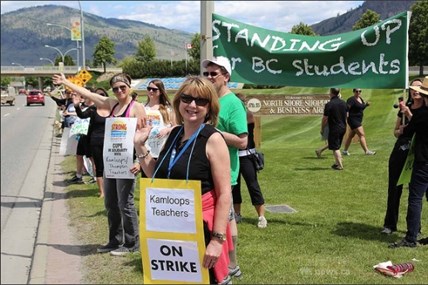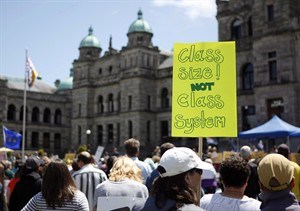
(JENNIFER STAHN / iNFOnews.ca)
September 16, 2014 - 6:39 AM
RICHMOND, B.C. - A tentative deal has been reached in the British Columbia teachers' strike, a mediator confirmed Tuesday.
The breakthrough in negotiations came on the fifth day of talks at a Richmond, B.C., hotel between the union and the employers' association with the help of Vince Ready.
Ready, known for his ability to solve even the toughest disputes, said both sides worked hard to reach the tentative deal, but he revealed few details.
“After all these hours, I am very pleased to announce that the parties have reached a tentative agreement," he told reporters outside the Delta Hotel.
"I’m not at liberty to release any of the details, nor are the parties. The parties are going to meet later this morning and finalize a few of the outstanding details, but generally speaking, there has been a tentative agreement initialized by the parties and that’s really all I got to say at this point.”
Negotiations resumed last week under increasing pressure from the public and suggestions by the government that legislating an end to the dispute was an option.
Last Wednesday, the B.C. Teachers' Federation voted overwhelmingly to end their dispute if the government agreed to binding arbitration — something the government firmly rejected.
Teachers launched full-scale job action two weeks before the summer break and students have missed more than two weeks of their new school year.
The federation and B.C. governments — no matter what political affiliation — have a decades-long history of animosity and difficult labour disputes.
More than 40,000 teachers in the province have been without a contract since June 2013 and class size and composition have been major stumbling blocks in the dispute.
Last January, a B.C. Supreme Court judge ruled the provincial government violated teachers' rights in 2002 when it declared they could no longer negotiate the size of classes or the number of support staff in classrooms. The province is appealing that decision.
But in an attempt to get movement at the bargaining table, the union began escalating stages of labour action in April.
About two weeks before the end of the last school year, teachers launched a full-scale walkout.
The teachers' union and the government's bargaining team barely spoke during the summer, and at the end of July, Finance Minister Mike de Jong announced the B.C. government would pay parents $40 a day for every child 12 and under if the teachers' strike continued into the start of the school year.
Veteran mediator Vince Ready agreed to make himself available in mid-August, but he walked away from the bargaining table Aug. 30, saying the two sides were just too far apart.
Schools remained closed Sept. 2 for half a million B.C. students.
The next day, Premier Christy Clark weighed into the dispute, saying no one wanted to see schools closed because of the ongoing teachers' strike, but the government had to stand firm or the labour dispute would never end.
Union president Jim Iker called on Sept. 5 for binding arbitration, saying it was the only solution available to get the dispute settled.
Education Minister Peter Fassbender panned the idea hours later. He said the province had a bad experience with the process once before, referring to a costly dispute with B.C. doctors more than a decade ago.
Later that evening, teachers rallied in downtown Vancouver, reiterating Iker's call for binding arbitration.
Fassbender explained Sept. 6 why he rejected the proposal. He said government negotiator Peter Cameron had advised against it, and added the offer was not serious and would not guarantee an end to the strike.
The teachers' union made the next move on Sept. 8, announcing its members would vote on binding arbitration.
One day before that vote, de Jong announced an expected $266 million financial surplus for the provincial government's first financial quarter but he declined to use the funds to settle the teachers' dispute.
Unions from across Canada announced last Wednesday, the day of the teachers' vote, they had pledged millions of dollars of donations and loans for a hardship fund for B.C.'s teachers.
The teachers' union announced that night results of the vote. Of the 30,699 teachers who cast ballots, 99.4 per cent voted to end the strike through binding arbitration.
Fassbender softened his stand last Thursday towards legislating teachers back to work and said legislation was another option available to government. Premier Christy Clark also said she was determined to get a deal before she leaves on a trade mission to India on Oct. 9, three days after the legislature resumes.
On Friday, the union confirmed its and the government's bargaining teams had begun negotiations and both sides spent the weekend in marathon discussions inside a hotel in Richmond, B.C.

B.C. teachers, parents and other union supporters rally on the lawn of the Legislature on June 16, 2014 in Victoria.
Image Credit: THE CANADIAN PRESS/Chad Hipolito
SIGNIFICANT DATES IN B.C.'S TROUBLED RELATIONSHIP WITH ITS TEACHERS
VANCOUVER - Significant dates in the long history of labour unrest within B.C.'s public education system:
1987: B.C.'s Social Credit government passes a law that gives teachers the right to form a union and strike. However, the B.C. Teachers' Federation largely sees it as an attack, since the law also decentralizes bargaining to local school districts, removes compulsory membership in the federation and establishes the B.C. College of Teachers.
1988-1993: The province's schools are beset by dozens of strikes under the new system, the first of which happened in Kitimat in November 1998, when teachers staged a 10-day strike. In 1993, the NDP government used legislation to end strikes in Vancouver and Surrey.
1994: The provincial government establishes provincewide collective bargaining between the teachers' federation and the newly created B.C. Public School Employers' Association, which bargains on behalf of the school boards and the government.
1998: The province negotiates a collective agreement directly with the teachers' union, bypassing the B.C. Public School Employers' Association. The contract is imposed on school boards through legislation.
August 2001: The recently elected Liberal government passes legislation that declares K-12 education an essential service.
January 2002: The government uses legislation to impose a contract and remove hundreds of provisions related to class size and class composition from the teachers' collective agreement, while also prohibiting them from being part of future negotiations. Teachers walk off the job for one day in protest. Christy Clark is education minister, nine years before becoming premier.
May: The B.C. Teachers' Federation files a constitutional challenge of the legislation.
October 2005: The B.C. government imposes a collective agreement on teachers, which prompts a two-week strike that is later ruled illegal.
June 2006: With the help of labour mediator Vince Ready, teachers and their employer reach a five-year collective agreement that includes a 16 per cent wage increase and a signing bonus of $4,000 per teacher. It is the first provincewide contract that did not require some form of legislation.
April 2011: A B.C. Supreme Court judge rules the 2002 legislation removing class size and composition from bargaining is unconstitutional. The court ruling restores the deleted provisions and gives the government one year to come up with a fix.
September: During negotiations, teachers withdraw a number of administrative tasks such as filling out report cards.
March 5, 2012: Teachers walk off the job for three days.
March 15: The government passes back-to-work legislation, which again deletes the clauses related to class size and class composition that were initially removed in 2002. The legislation allows class size and class composition to be part of future negotiations.
June 26: The teachers' federation and the employer reach a two-year collective agreement. The union files a court challenge of the most recent back-to-work legislation the following day.
Jan. 27, 2014: A B.C. Supreme Court judge again rules the provincial government violated teachers' collective bargaining rights by removing clauses related to class size and class composition and by prohibiting those issues from being negotiated. The ruling also awards the union $2 million.
Feb. 4: The B.C. government files an appeal.
May 26: The teachers' union begins rotating, one-day-a-week strikes throughout the province's school districts
June 17: Teachers stage a full-scale strike, cancelling the final two weeks of the school year.
Sept. 2: The first day of the school year is postponed.
Sept. 11: Education Minister Peter Fassbender no longer rules out back-to-work legislation — an option he previously insisted he would not use.
Sept.16: Tentative agreement reached between teachers' union and the government.
News from © The Canadian Press, 2014